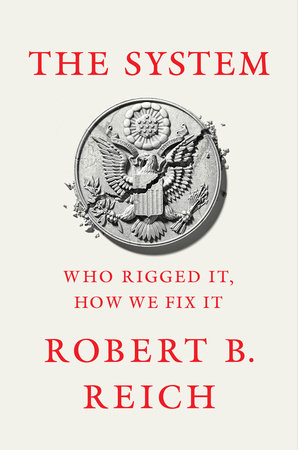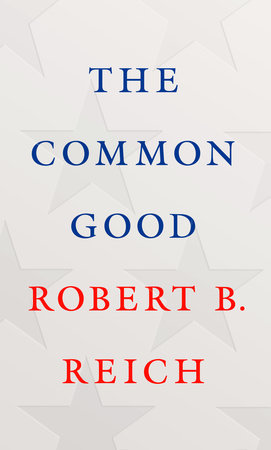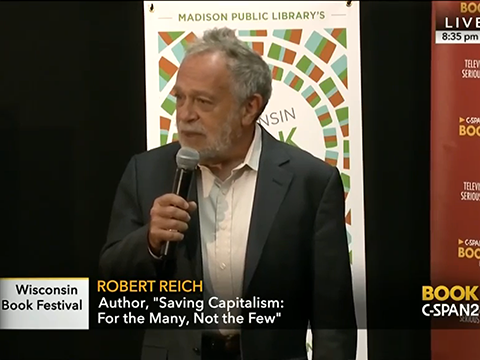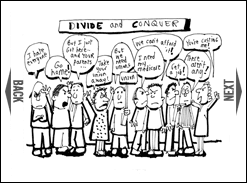 Robert Reich's writes at robertreich.substack.com. His latest book is "THE SYSTEM: Who Rigged It, How To Fix It." He is Chancellor's Professor of Public Policy at the University of California at Berkeley and Senior Fellow at the Blum Center. He served as Secretary of Labor in the Clinton administration, for which Time Magazine named him one of the 10 most effective cabinet secretaries of the twentieth century. He has written 17 other books, including the best sellers "Aftershock,""The Work of Nations," "Beyond Outrage," and "The Common Good." He is a founding editor of the American Prospect magazine, founder of Inequality Media, a member of the American Academy of Arts and Sciences, and co-creator of the award-winning documentaries "Inequality For All," streaming on YouTube, and "Saving Capitalism," now streaming on Netflix.
Robert Reich's writes at robertreich.substack.com. His latest book is "THE SYSTEM: Who Rigged It, How To Fix It." He is Chancellor's Professor of Public Policy at the University of California at Berkeley and Senior Fellow at the Blum Center. He served as Secretary of Labor in the Clinton administration, for which Time Magazine named him one of the 10 most effective cabinet secretaries of the twentieth century. He has written 17 other books, including the best sellers "Aftershock,""The Work of Nations," "Beyond Outrage," and "The Common Good." He is a founding editor of the American Prospect magazine, founder of Inequality Media, a member of the American Academy of Arts and Sciences, and co-creator of the award-winning documentaries "Inequality For All," streaming on YouTube, and "Saving Capitalism," now streaming on Netflix.
+ MY LINKTREE + SUPPORT INEQUALITY MEDIA
+ FOLLOW ON TUMBLR + TWITTER + FACEBOOK
NEW: The System
Who Rigged It, and How We Fix It
Order here:
AmazoniBookstoreBN.comIndieBoundRandomHouseThe Common Good
Why we must restore the idea of the common good to the center of our economics and politics
Order here:
AmazoniBookstoreBN.comIndieBound
Economics in Wonderland
A cartoon guide to a political world gone mad and mean
-

Saving Capitalism
For the Many, Not the Few
Order here:
AmazoniBookstoreBN.comIndieboundRandomHouse 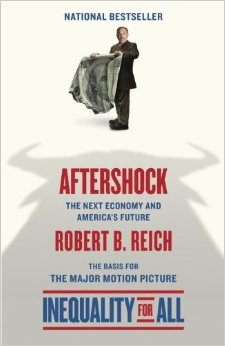
Aftershock
The Next Economy and America's Future
Buy this book at:
AmazoniBookstoreBN.comIndieboundPowellsRandomHouse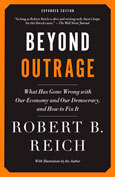
New Editions Available Now
Beyond Outrage:
What has gone wrong with our economy and our democracy, and how to fix itPreorder the Trade Paperback:
BN.comIndieBoundAmazonRandomHouse
Preorder the Expanded eBook:
AmazoniBookstoreBN.comRandomHouse
Preorder the Expanded, Enhanced eBook (w/ videos):
AmazoniBookstoreBN.com
Supercapitalism
The Transformation of Business, Democracy, and Everyday Life
Buy this book at:
AmazoniBookstoreBN.comIndieboundPowellsRandomHouse
Reason
Why Liberals Will Win the Battle for America
Buy this book at:
AmazoniBookstoreBN.comIndieboundPowellsRandomHouse
Locked in the Cabinet
A memoir of four years as Secretary of Labor
Buy this book at:
AmazonBN.comPowellsIndieboundRandomHouse
Why the Washington Post’s Attack on Bernie Sanders is Bunk
Thursday, October 1, 2015
The Washington Post just ran an attack on Bernie Sanders that distorts not only what he’s saying and seeking but also the basic choices that lie before the nation. Sanders, writes the Post’s David Fahrenthold, “is not just a big-spending liberal. And his agenda is not just about money. It’s also about control.”
Fahrenthold claims Sanders’s plan for paying for college with a tax on Wall Street trades would mean “colleges would run by government rules.”
Apparently Fahrenthold is unaware that three-quarters of college students today attend public universities financed largely by state governments. And even those who attend elite private universities benefit from federal tax subsidies flowing to wealthy donors. (Meg Whitman’s recent $30 million donation to Princeton, for example, is really $20 million from her plus an estimated $10 million she deducted from her taxable income.) Notwithstanding all this government largesse, colleges aren’t “run by government rules.”
The real problem is too many young people still can’t afford a college education. The move toward free public higher education that began in the 1950s with the G.I. Bill and was extended in the 1960s by leading public universities was reversed starting in the 1980s because of shrinking state budgets. Tuition has skyrocketed in recent years as states slashed education spending. It’s time to resurrect that earlier goal.
Besides, the biggest threats to academic freedom these days aren’t coming from government. They’re coming as conditions attached to funding from billionaires and big corporations that’s increasing as public funding drops.
When the Charles Koch Foundation pledged $1.5 million to Florida State University’s economics department, for example, it stipulated that a Koch-appointed advisory committee would select professors and undertake annual evaluations. The Koch brothers now fund 350 programs at over 250 colleges and universities across America. You can bet that funding doesn’t underwrite research on inequality and environmental justice.
Fahrenthold similarly claims Sanders’s plan for a single-payer system would put healthcare under the “control” of government.
But health care is already largely financed through government subsidies – only they’re flowing to private for-profit health insurers that are now busily consolidating into corporate laviathans. Anthem purchase of giant insurer Cigna will make it the largest health insurer in America; Aetna is buying Humana, creating the second-largest, with 33 million members.
Why should anyone suppose these for-profit corporate giants will be less “controlling” than government?
What we do know is they’re far more expensive than a single-payer system. Fahrenthold repeats the charge that Sanders’s healthcare plan would cost $15 trillion over ten years. But single-payer systems in other rich nations have proven cheaper than private for-profit health insurers because they don’t spend huge sums on advertising, marketing, executive pay, and billing.
So even if the Sanders single-payer plan would cost $15 trillion over ten years, Americans as a whole would save more than that.
Fahrenthold trusts the “market” more than he does the government but he overlooks the fact that government sets the rules by which the market runs (such as whether health insurers should be allowed to consolidate even further, or how much of a “charitable” tax deduction wealthy donors to private universities should receive, and whether they should get the deduction if they attach partisan conditions to their donations).
The real choice isn’t between government and the “market.” It’s between a system responsive to the needs of most Americans, or one more responsive to the demands of the super-rich, big business, and Wall Street – whose economic and political power have grown dramatically over the last three decades.
This is why the logic of Sanders’s ideas depends on the political changes he seeks. Fahrenthold says a President Sanders couldn’t get any of his ideas implemented anyway because Congress would reject them. But if Bernie Sanders is elected president, American politics will have been altered, reducing the moneyed interests’ chokehold over the public agenda.
Fahrenthold may not see the populism that’s fueling Bernie’s campaign, but it is gaining strength and conviction. Other politicians, as well as political reporters, ignore this upsurge at their peril.
